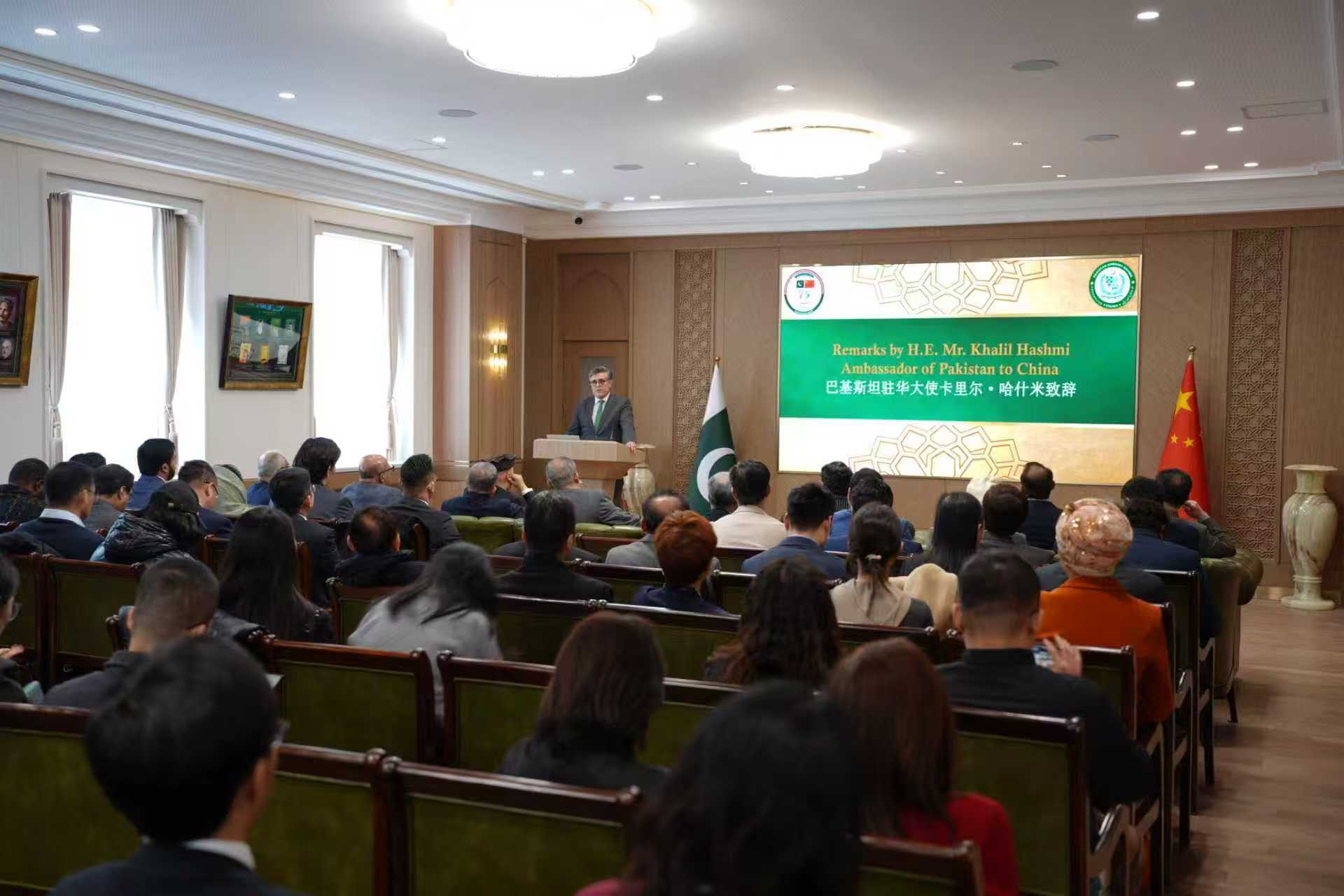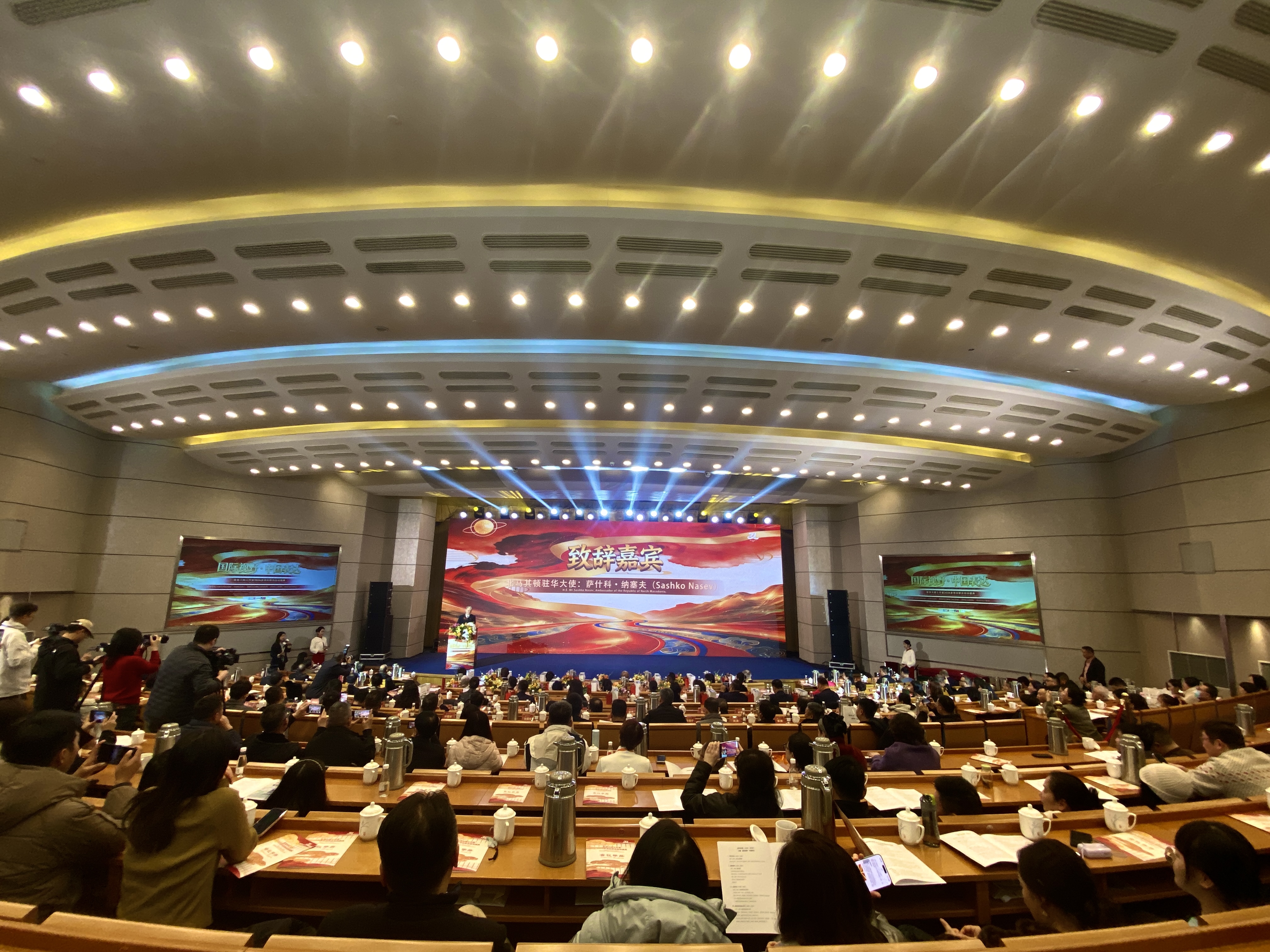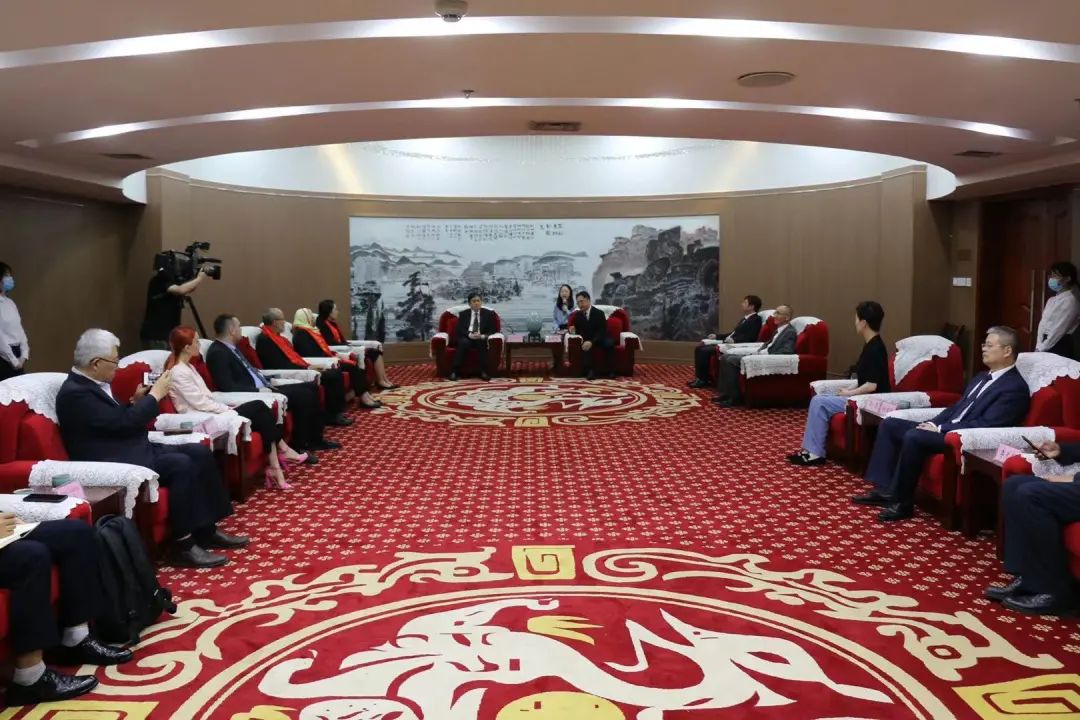New International relations are being established
来源:
作者: James O’Neill* 点击:
发布时间:2020-09-03 11:02:00
The isolation of the United States from the rest of the world community becomes increasingly obvious by the day. The most recent example was the vote in the United Nations Security Council against a United States motion to extend the sanctions on Iran for its alleged nuclear weapons program. Of the 15 members of the Security Council, only the United States and the Dominican Republic voted in favour of extending the sanctions. Russia and China both voted against. Perhaps more significantly, the other 11 member States of the Security Council abstained, including normally active supporters of the United States; the United Kingdom and France.
The United States Secretary of State Mike Pompeo made it clear that the United States would continue its policy of sanctions on Iran, regardless of the Security Council vote. It was the clearest possible indication that the United States takes a unilateral view of international law: either agree with us or we will go ahead and do what we want anyway!
As if the United Nations Security Council vote were not clear enough, the three most important European powers, United Kingdom, France and Germany, issued a joint statement on 20 August 2020 clearly stating their opposition to the United States’ attitude. The joint statement was remarkable for its blunt rejection of the United States’ attitude and behaviour.
The United States, the statement said, ceased to be a participant in the JCPOA following their withdrawal from the deal on 8th of May 2018. The trio wrote that they “cannot therefore support this action which is incompatible with our current efforts to support the JCPOA.”
The trio went on to say that they “are committed to preserving the processes and institutions which constitute the foundation of multilateralism. We remain guided by the objective of upholding the authority and integrity of the United Nations Security Council.”
This is an almost unprecedented rejection of United States unilateralism in modern times. Even the New York Times, normally a leading cheerleader of US unilateralism condemned (20/8/20) the United States government’s actions. They quoted US Secretary of State Mike Pompeo condemning the stance taken by the British, French and German governments, saying that those countries “chose to side with the ayatollahs.”
Pompeo has been one of the leading voices for United States unilateralism and the alacrity with which he turned on three normally supportive US allies, and in vituperative terms, is a measure of how far the United States has moved outside any pretence of multilateralism. Pompeo is a strong supporter of Israel, Iran’s strongest and most vociferous opponent in the region.
The fact that Israel is an undeclared nuclear power and refuses to participate in any nuclear non-proliferation treaties, or even officially acknowledge its nuclear status, is never the subject of criticism or adverse comment by any United States administration. The current regime is no exception.
The near unanimous view of the United Nations Security Council will not of course stop the United States from acting unilaterally and extending its sanctions against the Iranian government. Trump’s vague words about a new “deal” with Iran can be safely disregarded. United States antipathy to Iran goes back at least to the overthrow of the democratically elected government of Mossadeq in 1953.
A briefly warmer period of relations existed under the Shah’s regime until he in turn was ejected in the Islamic revolution of 1979. United States-Iran relations have been from poor to abysmal ever since. There is absolutely no reason to have any belief that Trump is sincere in his vague wishes for a “new deal”, or indeed that the deeply entrenched commitment to Israel at nearly all levels of the US power elite would even permit any such rapprochement.
Quite apart from its overwhelming commitment to Israel, United States support, in all forms, for the terrorist group Mujahedin al Kalk in its actions against the Islamic Republic make a mockery of any professed United States belief in normalising relations in the foreseeable future.
The United States claims to have a legal basis for its “snap back” against Iran for the latter’s alleged breaches of the 2015 JCPOA. Even that argument is profoundly flawed. The United States unilaterally abandoned the JCP0A in May 2018. The United Nations resolution passed in the light of the JCPOA approval of the Iranian deal was therefore also abandoned by the United States in May 2018. They are, as a matter of law, no longer parties to the deal.
Their ability to purport to take actions in respect of the deal is therefore a nullity. It comes down to the legal principle of estoppel, which is a term meaning that there is a bar imposed on conduct resulting from one’s own actions adverse to the original agreement. In this case, the United States as noted unilaterally withdrew from the JCPOA. It therefore as a matter of law is precluded from actions purporting to rely on a membership that no longer exists.
It is worth noting this point because the United States is always ready to purportedly rely on legal principles to justify its actions. As this illustration makes clear, such reliance is highly selective.
This legal reality has already been pointed out to the Trump administration by the European Union’s Josep Borrell, the man responsible for coordinating the joint committee charged with the responsibility of supervising the original nuclear agreement between Iran and the five permanent members of the Security Council and Germany. Mr Borrrell stated:
“As I have repeatedly recalled, the United States unilaterally ceased participation in the JCPOA by Presidential memorandum on 8 May 2018 and has subsequently not participated in any JCPOA related activities. It cannot, therefore, be considered to be a JCPOA participant State for the purposes of possible sanctions snap back foreseen by the resolution”.
The United States is not so stupid as to not be aware of the legal realities. To understand what they have done and why becomes the more important question. The answer to that question lies in the long history briefly outlined above. The United States is not interested in a resolution of the conflict. It is interested only in a war with Iran and their attempt at killing off the JCPOA is a thinly disguised attempt to provoke Iran into a reaction that can be used to justify an attack.
A lot has changed since the 2015 signing of the JCPOA, not least the radically improved and extended relationships of Iran with both Russia and China. That in turn is part of a radically changing geopolitical landscape throughout Eurasia. Strive as it might, the United States cannot prevent that development and US attempts to disrupt and constrain that development are doomed to fail. The real question will be: does the United States recognise that reality and adapt accordingly, or will it persist in its increasingly dangerous and isolated unilateralism. Unfortunately, the latter seems the more likely.
美国与国际社会的隔绝日益明显。最近的一个例子是,联合国安理会投票反对美国延长对伊朗核武器计划制裁的动议。在安全理事会的15个成员中,只有美国和多米尼加共和国投票赞成延长制裁。俄罗斯和中国都投了反对票。或许更重要的是,安全理事会的其他11个成员国弃权,包括通常积极支持美国的国家:英国和法国。
美国国务卿迈克·蓬佩奥明确表示,无论安理会投票结果如何,美国都将继续对伊朗实施制裁政策。这是最明显的迹象,表明美国对国际法采取单方面的观点:要么同意我们的观点,要么我们就继续做我们想做的事情! 似乎联合国安全理事会的投票不够明确,三个最重要的欧洲大国,联合王国、法国和德国,于2020年8月20日发表了一份联合声明,明确表示反对美国的态度。
联合声明因直言不讳地拒绝美国的态度和行为而引人注目。 声明称,自2018年5月8日退出协议后,美国不再是联合行动计划的参与者。三方写道,他们“因此不能支持这一行动,因为它与我们目前支持《联合行动纲领》的努力是不相容的。”
三人组接着说,他们“致力于维护构成多边主义基础的进程和机构。”我们仍然以维护联合国安全理事会的权威和完整性为指导。” 这几乎是美国在现代史无前例地拒绝单边主义。就连通常支持美国单边主义的纽约时报也谴责了美国政府的行为。他们引述美国国务卿迈克·蓬佩奥谴责英国、法国和德国政府的立场,称这些国家“选择站在阿亚图拉一边。”
庞贝一直是美国单边主义的主要声音之一,他对三个通常支持美国的盟友迅速回应,用谩骂的话来说,是衡量美国在多边主义的伪装之外走了多远的一个尺度。庞贝是以色列的坚定支持者,而以色列是伊朗在该地区最强大、最激烈的对手。
以色列是一个未申报的核大国,拒绝参加任何核不扩散条约,甚至拒绝正式承认其核地位,这一事实从未受到任何美国政府的批评或负面评论。当前的政权也不例外。 联合国安理会几乎一致的观点当然不会阻止美国单方面行动并延长对伊朗政府的制裁。特朗普关于与伊朗达成新“协议”的含糊其词可以放心地不予理会。
美国对伊朗的反感至少可以追溯到1953年推翻民主选举的摩萨德政府。 在沙阿政权统治下,两国关系曾短暂升温,直到他在1979年的伊斯兰革命中被驱逐。自那以后,美国和伊朗的关系一直从糟糕到糟糕。绝对没有理由相信特朗普对“新政”的模糊愿望是真诚的,也没有理由相信几乎所有美国权力精英阶层对以色列根深蒂固的承诺甚至会允许任何此类和解。
美国除了对以色列作出压倒性的承诺外,还以各种形式支持恐怖组织圣战者组织对伊斯兰共和国的行动,这是对美国宣称的在可预见的未来实现关系正常化信念的嘲弄。
美国声称对伊朗所谓的违反2015年《联合行动计划》的行为进行“反击”有法律依据。即使是这种观点也有很大的缺陷。美国于2018年5月单方面放弃了JCP0A。因此,美国在2018年5月也放弃了根据《联合行动计划》批准伊朗交易而通过的联合国决议。
从法律上讲,他们不再是交易的当事人。因此,他们声称就该交易采取行动的能力是无效的。这可以归结为禁止反言的法律原则,这是一个术语,意思是禁止因自己违背原始协议的行为而产生的影响。在这种情况下,如上所述,美国单方面退出了《联合行动纲领》。因此,作为一个法律问题,它被排除在声称依赖已不存在的成员资格的行动之外。
值得注意的是这一点,因为美国总是准备声称依靠法律原则来为其行动辩护。正如这个例子所表明的,这种依赖是高度选择性的。 欧盟的约瑟夫·博雷尔(Josep Borrell)已经向特朗普政府指出了这一法律现实。博雷尔负责协调负责监督伊朗与安理会五个常任理事国和德国之间最初核协议的联合委员会。博雷尔先生指出: “正如我一再回顾的那样,美国于2018年5月8日通过总统备忘录单方面停止参与《联合行动纲领》,随后也没有参与任何与《联合行动纲领》有关的活动。因此,就该决议所预见的可能的制裁紧急恢复而言,它不能被视为《联合行动纲领》的参与国。”
美国并不愚蠢到不了解法律现实。理解他们做了什么以及为什么成为更重要的问题。这个问题的答案存在于上面简要描述的漫长历史中。美国对解决冲突不感兴趣。它只对与伊朗的战争感兴趣,他们试图消灭联合行动计划是一种几乎不加掩饰的企图,旨在激起伊朗的反应,这种反应可以被用来为攻击辩护。
自2015年签署《联合行动计划》以来,发生了很多变化,尤其是伊朗与俄罗斯和中国的关系得到了根本改善和扩大。这反过来又是整个欧亚大陆地缘政治格局急剧变化的一部分。尽管美国竭尽全力,但它无法阻止这种发展,美国试图破坏和限制这种发展的努力注定要失败。真正的问题将是:美国是否认识到这一现实并做出相应调整,还是会坚持其日益危险和孤立的单边主义。不幸的是,后者似乎更有可能。
(作者是律师和政治分析师 James O’Neill)
(责任编辑: James O’Neill*)
The United States Secretary of State Mike Pompeo made it clear that the United States would continue its policy of sanctions on Iran, regardless of the Security Council vote. It was the clearest possible indication that the United States takes a unilateral view of international law: either agree with us or we will go ahead and do what we want anyway!
As if the United Nations Security Council vote were not clear enough, the three most important European powers, United Kingdom, France and Germany, issued a joint statement on 20 August 2020 clearly stating their opposition to the United States’ attitude. The joint statement was remarkable for its blunt rejection of the United States’ attitude and behaviour.
The United States, the statement said, ceased to be a participant in the JCPOA following their withdrawal from the deal on 8th of May 2018. The trio wrote that they “cannot therefore support this action which is incompatible with our current efforts to support the JCPOA.”
The trio went on to say that they “are committed to preserving the processes and institutions which constitute the foundation of multilateralism. We remain guided by the objective of upholding the authority and integrity of the United Nations Security Council.”
This is an almost unprecedented rejection of United States unilateralism in modern times. Even the New York Times, normally a leading cheerleader of US unilateralism condemned (20/8/20) the United States government’s actions. They quoted US Secretary of State Mike Pompeo condemning the stance taken by the British, French and German governments, saying that those countries “chose to side with the ayatollahs.”
Pompeo has been one of the leading voices for United States unilateralism and the alacrity with which he turned on three normally supportive US allies, and in vituperative terms, is a measure of how far the United States has moved outside any pretence of multilateralism. Pompeo is a strong supporter of Israel, Iran’s strongest and most vociferous opponent in the region.
The fact that Israel is an undeclared nuclear power and refuses to participate in any nuclear non-proliferation treaties, or even officially acknowledge its nuclear status, is never the subject of criticism or adverse comment by any United States administration. The current regime is no exception.
The near unanimous view of the United Nations Security Council will not of course stop the United States from acting unilaterally and extending its sanctions against the Iranian government. Trump’s vague words about a new “deal” with Iran can be safely disregarded. United States antipathy to Iran goes back at least to the overthrow of the democratically elected government of Mossadeq in 1953.
A briefly warmer period of relations existed under the Shah’s regime until he in turn was ejected in the Islamic revolution of 1979. United States-Iran relations have been from poor to abysmal ever since. There is absolutely no reason to have any belief that Trump is sincere in his vague wishes for a “new deal”, or indeed that the deeply entrenched commitment to Israel at nearly all levels of the US power elite would even permit any such rapprochement.
Quite apart from its overwhelming commitment to Israel, United States support, in all forms, for the terrorist group Mujahedin al Kalk in its actions against the Islamic Republic make a mockery of any professed United States belief in normalising relations in the foreseeable future.
The United States claims to have a legal basis for its “snap back” against Iran for the latter’s alleged breaches of the 2015 JCPOA. Even that argument is profoundly flawed. The United States unilaterally abandoned the JCP0A in May 2018. The United Nations resolution passed in the light of the JCPOA approval of the Iranian deal was therefore also abandoned by the United States in May 2018. They are, as a matter of law, no longer parties to the deal.
Their ability to purport to take actions in respect of the deal is therefore a nullity. It comes down to the legal principle of estoppel, which is a term meaning that there is a bar imposed on conduct resulting from one’s own actions adverse to the original agreement. In this case, the United States as noted unilaterally withdrew from the JCPOA. It therefore as a matter of law is precluded from actions purporting to rely on a membership that no longer exists.
It is worth noting this point because the United States is always ready to purportedly rely on legal principles to justify its actions. As this illustration makes clear, such reliance is highly selective.
This legal reality has already been pointed out to the Trump administration by the European Union’s Josep Borrell, the man responsible for coordinating the joint committee charged with the responsibility of supervising the original nuclear agreement between Iran and the five permanent members of the Security Council and Germany. Mr Borrrell stated:
“As I have repeatedly recalled, the United States unilaterally ceased participation in the JCPOA by Presidential memorandum on 8 May 2018 and has subsequently not participated in any JCPOA related activities. It cannot, therefore, be considered to be a JCPOA participant State for the purposes of possible sanctions snap back foreseen by the resolution”.
The United States is not so stupid as to not be aware of the legal realities. To understand what they have done and why becomes the more important question. The answer to that question lies in the long history briefly outlined above. The United States is not interested in a resolution of the conflict. It is interested only in a war with Iran and their attempt at killing off the JCPOA is a thinly disguised attempt to provoke Iran into a reaction that can be used to justify an attack.
A lot has changed since the 2015 signing of the JCPOA, not least the radically improved and extended relationships of Iran with both Russia and China. That in turn is part of a radically changing geopolitical landscape throughout Eurasia. Strive as it might, the United States cannot prevent that development and US attempts to disrupt and constrain that development are doomed to fail. The real question will be: does the United States recognise that reality and adapt accordingly, or will it persist in its increasingly dangerous and isolated unilateralism. Unfortunately, the latter seems the more likely.
美国与国际社会的隔绝日益明显。最近的一个例子是,联合国安理会投票反对美国延长对伊朗核武器计划制裁的动议。在安全理事会的15个成员中,只有美国和多米尼加共和国投票赞成延长制裁。俄罗斯和中国都投了反对票。或许更重要的是,安全理事会的其他11个成员国弃权,包括通常积极支持美国的国家:英国和法国。
美国国务卿迈克·蓬佩奥明确表示,无论安理会投票结果如何,美国都将继续对伊朗实施制裁政策。这是最明显的迹象,表明美国对国际法采取单方面的观点:要么同意我们的观点,要么我们就继续做我们想做的事情! 似乎联合国安全理事会的投票不够明确,三个最重要的欧洲大国,联合王国、法国和德国,于2020年8月20日发表了一份联合声明,明确表示反对美国的态度。
联合声明因直言不讳地拒绝美国的态度和行为而引人注目。 声明称,自2018年5月8日退出协议后,美国不再是联合行动计划的参与者。三方写道,他们“因此不能支持这一行动,因为它与我们目前支持《联合行动纲领》的努力是不相容的。”
三人组接着说,他们“致力于维护构成多边主义基础的进程和机构。”我们仍然以维护联合国安全理事会的权威和完整性为指导。” 这几乎是美国在现代史无前例地拒绝单边主义。就连通常支持美国单边主义的纽约时报也谴责了美国政府的行为。他们引述美国国务卿迈克·蓬佩奥谴责英国、法国和德国政府的立场,称这些国家“选择站在阿亚图拉一边。”
庞贝一直是美国单边主义的主要声音之一,他对三个通常支持美国的盟友迅速回应,用谩骂的话来说,是衡量美国在多边主义的伪装之外走了多远的一个尺度。庞贝是以色列的坚定支持者,而以色列是伊朗在该地区最强大、最激烈的对手。
以色列是一个未申报的核大国,拒绝参加任何核不扩散条约,甚至拒绝正式承认其核地位,这一事实从未受到任何美国政府的批评或负面评论。当前的政权也不例外。 联合国安理会几乎一致的观点当然不会阻止美国单方面行动并延长对伊朗政府的制裁。特朗普关于与伊朗达成新“协议”的含糊其词可以放心地不予理会。
美国对伊朗的反感至少可以追溯到1953年推翻民主选举的摩萨德政府。 在沙阿政权统治下,两国关系曾短暂升温,直到他在1979年的伊斯兰革命中被驱逐。自那以后,美国和伊朗的关系一直从糟糕到糟糕。绝对没有理由相信特朗普对“新政”的模糊愿望是真诚的,也没有理由相信几乎所有美国权力精英阶层对以色列根深蒂固的承诺甚至会允许任何此类和解。
美国除了对以色列作出压倒性的承诺外,还以各种形式支持恐怖组织圣战者组织对伊斯兰共和国的行动,这是对美国宣称的在可预见的未来实现关系正常化信念的嘲弄。
美国声称对伊朗所谓的违反2015年《联合行动计划》的行为进行“反击”有法律依据。即使是这种观点也有很大的缺陷。美国于2018年5月单方面放弃了JCP0A。因此,美国在2018年5月也放弃了根据《联合行动计划》批准伊朗交易而通过的联合国决议。
从法律上讲,他们不再是交易的当事人。因此,他们声称就该交易采取行动的能力是无效的。这可以归结为禁止反言的法律原则,这是一个术语,意思是禁止因自己违背原始协议的行为而产生的影响。在这种情况下,如上所述,美国单方面退出了《联合行动纲领》。因此,作为一个法律问题,它被排除在声称依赖已不存在的成员资格的行动之外。
值得注意的是这一点,因为美国总是准备声称依靠法律原则来为其行动辩护。正如这个例子所表明的,这种依赖是高度选择性的。 欧盟的约瑟夫·博雷尔(Josep Borrell)已经向特朗普政府指出了这一法律现实。博雷尔负责协调负责监督伊朗与安理会五个常任理事国和德国之间最初核协议的联合委员会。博雷尔先生指出: “正如我一再回顾的那样,美国于2018年5月8日通过总统备忘录单方面停止参与《联合行动纲领》,随后也没有参与任何与《联合行动纲领》有关的活动。因此,就该决议所预见的可能的制裁紧急恢复而言,它不能被视为《联合行动纲领》的参与国。”
美国并不愚蠢到不了解法律现实。理解他们做了什么以及为什么成为更重要的问题。这个问题的答案存在于上面简要描述的漫长历史中。美国对解决冲突不感兴趣。它只对与伊朗的战争感兴趣,他们试图消灭联合行动计划是一种几乎不加掩饰的企图,旨在激起伊朗的反应,这种反应可以被用来为攻击辩护。
自2015年签署《联合行动计划》以来,发生了很多变化,尤其是伊朗与俄罗斯和中国的关系得到了根本改善和扩大。这反过来又是整个欧亚大陆地缘政治格局急剧变化的一部分。尽管美国竭尽全力,但它无法阻止这种发展,美国试图破坏和限制这种发展的努力注定要失败。真正的问题将是:美国是否认识到这一现实并做出相应调整,还是会坚持其日益危险和孤立的单边主义。不幸的是,后者似乎更有可能。
(作者是律师和政治分析师 James O’Neill)
版权及免责声明
1、本网转载媒体稿件旨在传播更多有益信息,并不代表同意该观点,本网不承担稿件侵权行为的连带责任;
2、在本网博客/论坛发表言论者,文责自负。
推荐文章
热点内容
-
 查谟和克什米尔历史与现状研讨会在
2026年2月5日,巴基斯坦驻华使馆举办“查谟和克什米尔历史与现状研讨会”,巴基斯坦使馆外交官和数十位中外学者出席。使馆工作人员首先宣读了巴基斯坦总理夏巴兹·谢
查谟和克什米尔历史与现状研讨会在
2026年2月5日,巴基斯坦驻华使馆举办“查谟和克什米尔历史与现状研讨会”,巴基斯坦使馆外交官和数十位中外学者出席。使馆工作人员首先宣读了巴基斯坦总理夏巴兹·谢
-
 CECTV《声起东方》全球中文经
制片主任:李敏
CECTV《声起东方》全球中文经
制片主任:李敏
- ・《少林点穴的隐秘力量》纪录片在郑州圆满杀青
- ・2025GT世界挑战赛北京亦庄站启幕
- ・北京市侨联召开海外北京会座谈交流会
- ・2025GT世界挑战赛北京亦庄站圆满落幕
- ・短片【未封存的岁月日记】的时代意义
- ・侨智未来·创新人才发展活动举办
- ・2025GT世界挑战赛北京亦庄站筹备进入冲刺阶段
- ・无锡味道 世界共享LA LISTE 2025全球美食
- ・2025“校园星主播”国际展演(韩国站)圆满结束
- ・“勇气少年团”综艺节目开始选拨啦
- ・CECTV《声起东方》全球中文经典朗读节目
- ・美国迈阿密大学访问学者项目
- ・2012第二届中国国际积极心理学大会
- ・首届世界香具文化大会暨高峰论坛在浙江龙泉圆满召开
最新文章
- ・查谟和克什米尔历史与现状研讨会在京举行
- ・时隔33年重聚首!英达携《我爱我家》原班人马打造新剧
- ・暖意初萌,蓄势而生,国共两党智库论坛在立春时节举办恰
- ・张录工作室2026多项目联合计划在杭启幕 构建文化出
- ・AI漫剧人才评价标准研讨会在京举行
- ・百集电视访谈栏目《健康大讲堂》----磷虾油与健康第
- ・百集电视访谈栏目《健康大讲堂》----特医食品与健康
- ・“汇聚力量·点燃希望”大手牵小手“我和星宝过大年”暨
- ・古巴民族英雄何塞·马蒂诞辰173周年暨菲德尔·卡斯特
- ・以象为维 医艺新章
- ・CECTV《声起东方》全球中文经典朗读节目
- ・“勇气少年团”综艺节目开始选拨啦
- ・2025“校园星主播”国际展演(韩国站)圆满结束
- ・首届世界香具文化大会暨高峰论坛在浙江龙泉圆满召开
- ・2012第二届中国国际积极心理学大会
- ・美国迈阿密大学访问学者项目









